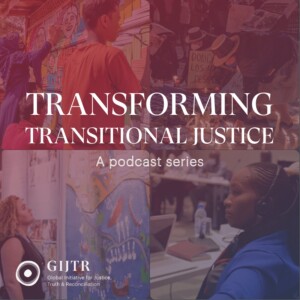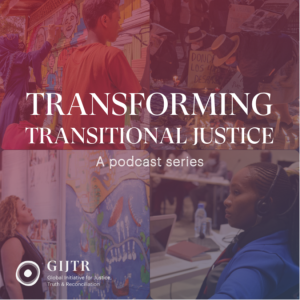Transforming Transitional Justice
”Transforming Transitional Justice” is a podcast from the Global Initiative for Justice, Truth and Reconciliation, a flagship program of the International Coalition of Sites of Conscience, a global network of historic sites, museums and memory initiatives that support communities to confront painful pasts in order to establish more just and peaceful societies today.
Episodes

Thursday May 09, 2024
Thursday May 09, 2024
Welcome to the third episode of Transforming Transitional Justice, a podcast from the Global Initiative for Justice, Truth and Reconciliation, a flagship program of the International Coalition of Sites of Conscience, a global network of historic sites, museums and memory initiatives that support communities to confront painful pasts in order to establish more just and peaceful societies today.
Families are often sidelined in national searches for the disappeared in post-conflict settings. There are all too many cases where victims’ families have been excluded from the process and apprised of only some, if any, of the findings. And yet locating and identifying Missing and Disappeared Persons lost in conflict is a central component of transitional justice processes across the globe, and particularly in the global South.
In this episode we will discuss the unique opportunities for healing, accountability, and justice offered by forensic technologies. The emotional burden, for both practitioners and families, is immense, and it is important to understand how to delicately work through these painful emotions. The sense of closure and relief offered to families' is immeasurable, making forensic technology an absolutely vital tool in post-conflict healing and reconstruction.
VISIT: www.gijtr.org to learn more
Guests on this episode include:
Fredy Peccerelli, the Executive Director of the The Forensic Anthropology Foundation of Guatemala.
Cindy Mansour. a doctoral student in forensic anthropology from Beirut, Lebanon, and a forensic researcher at Act for the Disappeared.

Thursday Apr 25, 2024
Thursday Apr 25, 2024
Welcome to the second episode of Transforming Transitional Justice, a podcast from the Global Initiative for Justice, Truth and Reconciliation, a flagship program of the International Coalition of Sites of Conscience, a global network of historic sites, museums and memory initiatives that support communities to confront painful pasts in order to establish more just and peaceful societies today.
Each episode of the podcast focuses on common issues that post-conflict communities face - from helping victims heal from conflict-related sexual violence and bolstering communities' ability to search for their missing to documenting violations. We'll explore these issues through GIJTR's unique, survivor-centered lens.
In this episode, we explore the complex process of healing after conflict related sexual violence. Despite the many conflicts fought around the globe in the last century, it was not until the 1990s that the prevalence of sexual violence during them began to be addressed. Some attribute this to the powerful testimonies of survivors given during the international criminal tribunals for Rwanda and the former Yugoslavia, which made it all too clear that sexual violence - long seen as a byproduct of war - was in fact a deliberate strategy used to fracture the social fabric of communities.
Our guests guide us through the realities of conflict-related sexual violence, the importance of locally led, compassionate care, and share ways that transitional justice mechanisms can better help societies and individuals begin to heal from such trauma.
VISIT: www.gijtr.org to learn more
Guests include:
Sarah Case, a deputy program director of the Global Initiative for Justice, Truth, and Reconciliation, who has worked with survivors of sexual violence in multiple contexts, including Colombia, Ukraine, Nepal, and Cambodia.
Fatou Baldeh, the founder of Women in Liberation and Leadership, or WILL, a local GIJTR partner in The Gambia that works to support victims of sexual and gender-based violence in the country.
Bibiana Pinaranda Sepulveda, a Colombian activist and participant in a GIJTR project focusing on the reintegration of women victims of conflict-related sexual violence and children born of war.

Thursday Apr 11, 2024
Thursday Apr 11, 2024
Welcome to the first episode of Transforming Transitional Justice, a podcast from the Global Initiative for Justice, Truth and Reconciliation, a flagship program of the International Coalition of Sites of Conscience, a global network of historic sites, museums and memory initiatives that support communities to confront painful pasts in order to establish more just and peaceful societies today.
Each episode will focus on common issues that post-conflict communities face - from helping victims heal from conflict-related sexual violence and bolstering communities' ability to search for their missing to documenting violations. We'll explore these issues through GIJTR's unique, survivor-centered lens.
In this first episode, we're going to lay the groundwork, establishing exactly what transitional justice is, how previous models have given survivors short shrift, and how new ones can center survivors and create spaces for them to lead.
Please note views expressed by non-U.S. Government employees in this episode do not represent the views nor should be seen as endorsed by the U.S. Government.
VISIT: www.gijtr.org to learn more
Guests Include:
Ereshnee Naidu-Silverman, the Senior Director for the Global Transitional Justice Initiative, the Coalition’s flagship program on transitional justice.
Dr. Patricia Davis, a director of the Bureau of Democracy, Human Rights and Labor (DRL) Office of Global Programs
Annah Moyo, Executive Director at CSVR
Brahmy Poologasingham, the Senior Technical Advisor and Lead of Transitional Justice & Accountability Programs at the Department of State’s Bureau of Democracy, Human Rights and Labor

Sunday Mar 17, 2024






